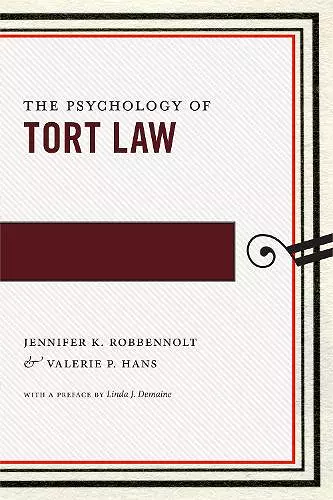The Psychology of Tort Law
Jennifer K Robbennolt author Valerie P Hans author
Format:Hardback
Publisher:New York University Press
Published:1st Jan '16
Currently unavailable, and unfortunately no date known when it will be back
This hardback is available in another edition too:
- Paperback£32.00(9781479814183)

Tort law regulates most human activities: from driving a car to using consumer products to providing or receiving medical care. Injuries caused by dog bites, slips and falls, fender benders, bridge collapses, adverse reactions to a medication, bar fights, oil spills, and more all implicate the law of torts. The rules and procedures by which tort cases are resolved engage deeply-held intuitions about justice, causation, intentionality, and the obligations that we owe to one another. Tort rules and procedures also generate significant controversy—most visibly in political debates over tort reform.
The Psychology of Tort Law explores tort law through the lens of psychological science. Drawing on a wealth of psychological research and their own experiences teaching and researching tort law, Jennifer K. Robbennolt and Valerie P. Hans examine the psychological assumptions that underlie doctrinal rules. They explore how tort law influences the behavior and decision-making of potential plaintiffs and defendants, examining how doctors and patients, drivers, manufacturers and purchasers of products, property owners, and others make decisions against the backdrop of tort law. They show how the judges and jurors who decide tort claims are influenced by psychological phenomena in deciding cases. And they reveal how plaintiffs, defendants, and their attorneys resolve tort disputes in the shadow of tort law.
Robbennolt and Hans here shed fascinating light on the tort system, and on the psychological dynamics which undergird its functioning.
Provides an engaging description of how human psychology influences both the development of tort law and policy and the decisions of litigants, lawyers, judges, and jurors as they navigate the American civil justice system. Their explanations of psychological theory include cutting-edge empirical research and vivid descriptions of classic court cases that lawyers will immediately recognize from law school as well as contemporary cases drawn from todays headlines. For lawyers, the volume offers valuable insights about how judges and jurors are likely to interpret evidence presented at trial. For policymakers, it highlights the conflicts that arise when human intuition diverges from traditional principles of tort law. And it challenges researchers in social psychology and law with a host of unexplored topics to investigate. -- Paula Hannaford-Agor,Director, Center for Jury Studies, National Center for State Courts
This book series is off to a fantastic start with this volume on tort law. . . . [The volume] is expansive but highly engaging and readable. The authors, both psychologists teaching in law schools, maximize the utility of their efforts by bringing normally scattered psychological research findings to bear on core concepts in the law. Those who believe that the law should develop its doctrines with reference to human psychology will be immensely aided in their efforts to achieve that objective by the availability of this comprehensive but very accessible review of existing psychological research findings relevant to tort law. -- Tom R. Tyler,Macklin Fleming Professor of Law and Professor of Psychology, Yale University
ISBN: 9780814724941
Dimensions: unknown
Weight: unknown
320 pages